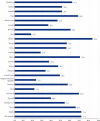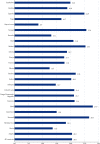Association between Attitude towards Wife Beating and Childhood Diarrhea: A Demographic and Health Survey-Based Study in 25 Sub-Saharan African Countries
- PMID: 34812250
- PMCID: PMC8605907
- DOI: 10.1155/2021/4870994
Association between Attitude towards Wife Beating and Childhood Diarrhea: A Demographic and Health Survey-Based Study in 25 Sub-Saharan African Countries
Abstract
Background: Childhood diarrhea remains a major public health problem in sub-Saharan Africa (SSA). Women empowerment reduces child mortality, and wife beating attitude is one of the indicators of women empowerment. There is a dearth of evidence about wife beating attitudes and childhood diarrhea in SSA. Therefore, the present study aimed to examine the association between attitude towards wife beating and diarrhea among under-five children.
Methods: We used Demographic and Health Surveys from 25 countries in SSA that were conducted between 2010 and 2020. Using Stata version 14 software, we carried out the analysis on 153,864 children under five. Bivariate and multivariate logistic regression analyses were applied, and the results were presented using adjusted odd ratios (aOR) at 95% confidence interval (CI).
Results: The pooled results show that 71.4% of married women disagreed with wife beating. About 20.5% of under-five children of married women had diarrhea. Childhood diarrhea varied from highest prevalence in Chad (27.9%) to the lowest prevalence in Sierra-Leone (8.5%). The study showed lower odds of diarrhea among children of married women who disagreed with wife beating (aOR = 0.66 95% CI; 0.54-0.80) compared to children of married women who agreed with wife beating. Moreover, the study results show that women's age (35-39 years-aOR = 0.48, 95% CI; 0.31-0.74, 40-44 years-aOR = 0.57, 95% CI; 0.35-0.93, 45-49 years-aOR = 0.35, 95% CI; 0.16-0.79) was negatively associated with childhood diarrhea, while husband's education (primary school-aOR = 1.36, 95% CI; 1.05-1.77), parity (ever born 3-4 children-aOR = 1.36, 95% CI; 1.09-1.70, and 5+ children-aOR = 1.56, 95% CI; 1.14-2.12), and religion (Muslim-aOR = 3.56, 95% CI; 1.44-8.83) were positively associated with diarrhea among under-five children.
Conclusions: The study shows association between women attitude towards wife beating and childhood diarrhea. Therefore, empowering women, especially young women by increasing awareness about domestic violence, their rights, and empowering them through education and economic advancement need to be considered in order to reduce childhood diarrhea. Moreover, fertility control or birth spacing and working closely with religious leaders are important factors to consider in reducing childhood diarrhea.
Copyright © 2021 Betregiorgis Zegeye et al.
Conflict of interest statement
The authors declare that they have no conflicts of interest.
Figures
Similar articles
-
Understanding the factors associated with married women's attitudes towards wife-beating in sub-Saharan Africa.BMC Womens Health. 2022 Jun 18;22(1):242. doi: 10.1186/s12905-022-01809-8. BMC Womens Health. 2022. PMID: 35717213 Free PMC article.
-
Does attitude towards wife beating determine infant feeding practices during diarrheal illness in sub-Saharan Africa?Trop Med Health. 2021 Oct 9;49(1):80. doi: 10.1186/s41182-021-00369-1. Trop Med Health. 2021. PMID: 34627410 Free PMC article.
-
Individual-, household-, and community-level factors associated with pregnant married women's discriminatory attitude towards people living with HIV in sub-Saharan Africa: A multicountry cross-sectional study.Health Sci Rep. 2021 Oct 27;4(4):e430. doi: 10.1002/hsr2.430. eCollection 2021 Dec. Health Sci Rep. 2021. PMID: 34746443 Free PMC article.
-
Male adolescents' attitude towards justifying wife beating: a study on 20 low and lower-middle-income countries.BMC Public Health. 2025 May 23;25(1):1903. doi: 10.1186/s12889-025-23088-2. BMC Public Health. 2025. PMID: 40410693 Free PMC article.
-
Uptake and determinants of routine immunization among vulnerable children and adolescents in sub-Saharan Africa: A scoping review.Vaccine. 2025 Apr 30;54:127021. doi: 10.1016/j.vaccine.2025.127021. Epub 2025 Mar 20. Vaccine. 2025. PMID: 40117940
Cited by
-
The Quality of Counseling for Headache OTC Medications in German Community Pharmacies Using a Simulated Patient Approach: Are There Differences between Self-Purchase and Purchase for a Third Party?ScientificWorldJournal. 2022 Mar 23;2022:5851117. doi: 10.1155/2022/5851117. eCollection 2022. ScientificWorldJournal. 2022. PMID: 35370483 Free PMC article.
-
Assessing the joint effects of education, economic status, empowerment, and employment (4Es) disparities on the co-coverage of maternal, newborn and child health care services in sub-Saharan Africa: an application of the intersectionality approach.J Glob Health. 2025 May 9;15:04124. doi: 10.7189/jogh.15.04124. J Glob Health. 2025. PMID: 40341089 Free PMC article.
References
-
- WHO Children. Improving survival and wellbeing. 2021. https://ww.who.int/news-room/fact-sheets.detail/children-reducing-mortality .
-
- UNICEF Child Health. Diarrheal disease. 2021. https://data.unicef.org/topic/child-health/diarrhoeal-disease/
-
- MOWCY. Gender Equality, Women’s Empowerment and Child Wellbeing in Ethiopia . New York, NY, USA: UNICEF; 2019.
-
- USAID. Gender Equality and Women’s Empowerment in Ethiopia. 2018. https://www.usaid.gov/ethiopia/gender-equality-andwomens-empowerment .
-
- Malhotra A., Schuler S. R., Boender C. Measuring women’s empowerment as a variable in international development. 2002. https://siteresources.worldbank.org/INTEMPOWERMENT/Resources/486312-1095... .
MeSH terms
LinkOut - more resources
Full Text Sources
Medical
Research Materials




